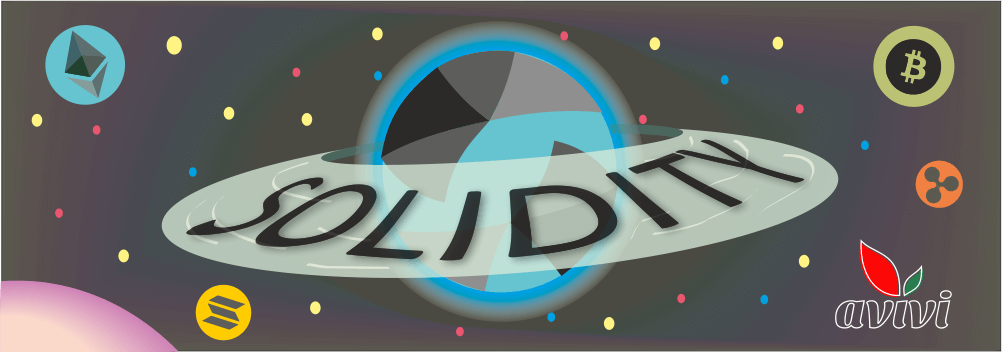Solidity is the main language for creating smart contracts from Avivi
2 September 2022
next article
High-level programming languages with syntax, including Python, Pascal, JS or Haskel, are best suited for creating smart contracts. However, there is a language that, in fact, was created for writing smart contracts, which means that it allows you to do exactly these tasks efficiently, quickly and cheaply. We will talk about the latter even in a separate section of this article about the best programming language for smart contracts, which Avivi employees have mastered well — Solidity.
A bit of history
In 2009, the world learned about Bitcoin and it immediately became mainstream with a huge prospect for expanding the possibilities of using blockchain technology. However, the Bitcoin system itself is quite limited and is only great for decentralized cryptocurrency exchange, which, in fact, it successfully does today. Other blockchain projects required a different, more flexible and versatile system backed by its own programming tool for the best further development. And such an ICO took place: a new Ethereum network appeared with the unique Solidity language.
The author of the language was Ethereum CTO Gavin Wood, who proposed its concept in 2014 using the basics of Python, C++ and Javascript. The combination of samples of the best languages turned out to be effective, and since 2015, Solidity has officially received the status of a separate programming language. For Javascript experts, this language will seem very familiar and intuitive, as it has a similar syntax. But if you want to personally understand smart contracts, then you should know both of these languages.
Features and applications of Solidity
So what makes Solidity so special? The first is the code of the Ethereum network itself. In other words: no Solidity - no Ethereum. We already know that this network became the evolution of Bitcoin, the next step in the development of blockchain technologies for their wider application in various areas of human life and activity. So if Bitcoin itself is an asset that is simply distributed among participants, Ethereum is designed to create new assets and manage them in the virtual world.
In this way, Solidity allows you to create new tokens and give them individual value. The language allows you to tokenize virtually anything in the real world using the ERC20 family of standards and launch ICOs directly on the Ethereum network. To manage tokens, rules and algorithms are needed, and here Solidity is responsible for creating smart contracts — an analogue of a regular agreement that is executed regardless of the wishes of its participants according to a defined scenario and stored in the blockchain.
In a broad sense, Solidity allows you to create your own DApps — decentralized applications that work independently and are not subject to external influence from any individuals or legal entities. In terms of functionality, such applications may not differ in any way from those you download from the Appstore or PlayMarket, except for open source, the ability to work with cryptocurrencies, freedom from intermediaries and the use of blockchain. So we can see that the Solidity language allows you to do everything that ensures the advancement of your projects in Ethereum.
Significant advantages
So, we found out what Solidity is and why it is needed. But, as was said at the beginning, other high-level programming languages are also suitable for creating smart contracts. So why, for example, wouldn't a good Python programmer create a better contract than a Solidity developer? The answer to this question is not as simple as it seems, but the result is obvious.
Indeed, the solutions needed to work in Ethereum can be written in other languages. But the decisive issue here is the question of cost — not creation, but use. As we mentioned in the Avivi blog article “An audit is the last thing you need before the smart contract starts working”, everything that runs or is stored on the blockchain needs to pay for gas. For Ethereum, it is also charged in ETH and each term of code and each function has its own fixed cost. Accordingly, the more extensive our code or the more complex the functions, the more expensive it will be to launch and execute a smart contract, create a token, or operate a DApp.
Solidity, as the code language of the Ethereum network, is the most optimized for development. With a perfect mastery of this programming language, developers are able to reduce the number of lines of code several times and use one function where another multi-level language would need an entire array. According to the observations of Avivi developers who speak different languages, the code on Solidity takes 30%-40% less than a similar solution in another language. Therefore, the conclusion does not need justification: if Solidity was created specifically for the implementation of projects in Ethereum, then only it should be used for this.
Our company specializes in all types of work with smart contracts, and our employees have been improving their Solidity programming skills over a long period of time. That is why we are ready to offer clients effective solutions that will save costs and increase profits. We will be happy to help you with our skills and knowledge of Solidity.
We will reach out to within 10 minutes



